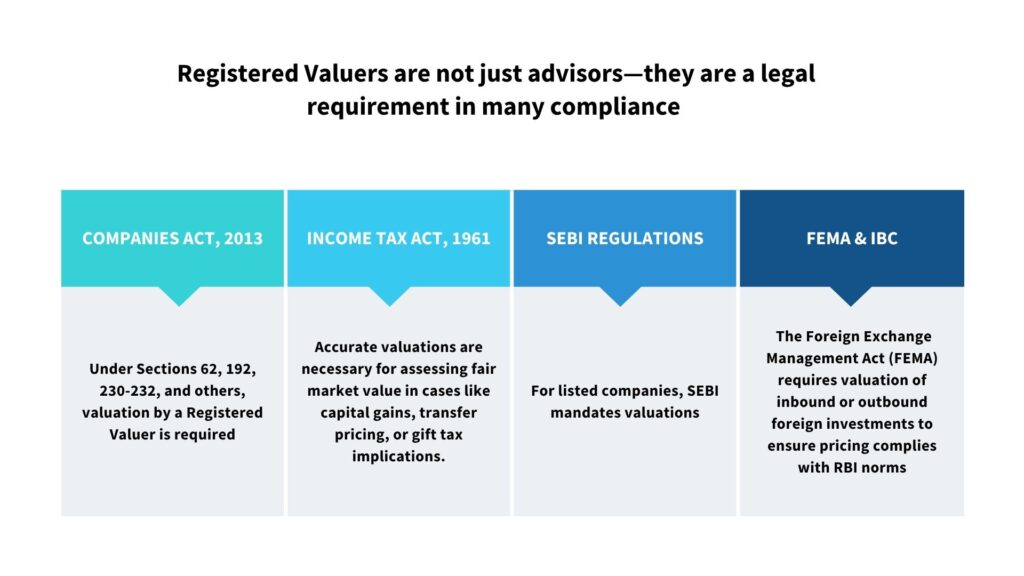As Indian businesses evolve in complexity and scale, the need for accurate, credible, and compliant business valuation has never been greater. Whether you’re a startup raising capital, a company navigating a merger, or a promoter managing regulatory obligations, understanding the true value of your business is essential for both strategic decisions and legal compliance.
At the heart of this process stands the Registered Valuer, a professional recognized by Indian law to carry out impartial and technically sound business valuations. Their involvement is not just a best practice; in many scenarios, it’s a legal necessity. From satisfying regulatory requirements under the Companies Act and Income Tax Act to facilitating investor trust and dispute resolution, a Registered Valuer brings credibility, transparency, and legal legitimacy to the valuation process.
Table of Contents
ToggleWho Is a Registered Valuer?
A Registered Valuer is a professional accredited by the Insolvency and Bankruptcy Board of India (IBBI) under the Companies (Registered Valuers and Valuation) Rules, 2017. To qualify, an individual must possess specific educational qualifications, relevant industry experience, and pass the IBBI’s Valuation Examination. They must also be a member of a Registered Valuer Organisation (RVO).
Registered Valuers can be categorized into three main asset classes:
- Securities or Financial Assets – For valuing shares, debentures, and business enterprises.
- Land and Building – For real estate assets including land, buildings, and commercial property.
- Plant and Machinery – For physical assets used in operations or manufacturing.
Their recognition by IBBI ensures that their reports are accepted by regulatory authorities such as SEBI, MCA, RBI, and the Income Tax Department. In legal terms, only a Registered Valuer can conduct certain valuations required under Indian corporate laws, making their role indispensable for ensuring both strategic clarity and statutory compliance.
Core Responsibilities in Business Valuation
Registered Valuers are entrusted with some of the most critical tasks in the valuation ecosystem. Their responsibilities extend far beyond simply assigning a number to a business; they play a vital role in maintaining financial clarity, regulatory alignment, and stakeholder confidence.
- Delivering Accurate and Fair Market Value Assessments:
A Registered Valuer applies globally and nationally accepted methodologies—such as Discounted Cash Flow (DCF), Comparable Company Analysis, and Net Asset Value (NAV)—to determine the fair value of a business. This is essential for fundraising, restructuring, buybacks, or resolving shareholder disputes. - Ensuring Independence and Impartiality:
One of the biggest advantages of involving a Registered Valuer is the assurance of an unbiased, professional opinion. Their independence helps prevent overvaluation or undervaluation and protects all parties involved in a transaction, especially during contentious scenarios like exits or family business splits. - Preparing Regulator-Accepted Documentation:
Valuation reports prepared by Registered Valuers are structured to meet the documentation standards prescribed by authorities such as the Ministry of Corporate Affairs (MCA), SEBI, and the Income Tax Department. These reports are often submitted during audits, regulatory filings, legal proceedings, or investment negotiations.
Compliance Roles Under Key Indian Laws
Registered Valuers are not just advisors—they are a legal requirement in many compliance scenarios across Indian corporate law. Their certified reports are mandatory to meet various statutory obligations, ensuring businesses stay on the right side of the law.

- Companies Act, 2013:
Under Sections 62, 192, 230-232, and others, valuation by a Registered Valuer is required during events like:- Preferential share allotments
- Mergers and demergers
- Sale or purchase of assets from related parties
- Issuance of shares for consideration other than cash
Example: During a merger of two group entities, the Companies Act mandates a valuation report from a Registered Valuer to determine the share exchange ratio.
- Income Tax Act, 1961:
Accurate valuations are necessary for assessing fair market value in cases like capital gains, transfer pricing, or gift tax implications. The valuation ensures that the tax liability is calculated correctly and can withstand scrutiny from income tax authorities.
Example: In the case of issuing shares at a premium to investors, Section 56(2)(viib) requires a valuation to justify the share price and avoid taxation on the premium.
- SEBI Regulations:
For listed companies, SEBI mandates valuations in scenarios like:
- Initial Public Offerings (IPOs)
- Rights issues
- Delisting of shares
- Takeover offers
- FEMA & IBC:
The Foreign Exchange Management Act (FEMA)requires valuation during inbound or outbound foreign investments to ensure pricing is as per RBI norms. Under the Insolvency and Bankruptcy Code (IBC), valuers are appointed during the resolution or liquidation process to assess the fair value and liquidation value of assets.
Example: A company undergoing liquidation under IBC must appoint two Registered Valuers to determine the liquidation value of assets before distribution to creditors.
Strategic Value Beyond Compliance
While the legal requirement for engaging a Registered Valuer is clear, their strategic importance goes much deeper. Businesses that take a proactive approach to valuation, rather than treating it as a checkbox, often gain significant advantages.
- Enhancing Investor Confidence and Stakeholder Trust:
A professionally conducted valuation by a Registered Valuer assures investors, lenders, and stakeholders that the numbers are transparent and objective. This fosters trust, especially during high-stakes decisions like funding rounds or exit negotiations. - Supporting Fundraising, M&A, and Dispute Resolution:
Whether you’re preparing for a venture capital raise, planning a merger, or navigating a shareholder dispute, a well-prepared valuation report acts as a neutral benchmark. It ensures all parties are aligned, reducing friction and increasing the chances of a successful outcome. - Helping Businesses Avoid Legal Penalties or Regulatory Rejections:
Non-compliance or flawed valuation practices can lead to scrutiny from regulators, taxation disputes, or even rejection of key business filings. A Registered Valuer helps mitigate these risks by delivering reports that meet the stringent documentation and rationale expected by Indian authorities.
Summary Table: Areas Where Registered Valuers Add Value
Area of Imapact | Role of Registered Valuer |
Business Valuation | Fair, defensible valuation based on sound methodology |
Legal Compliance | Ensures alignment with Companies Act, Income Tax, SEBI, FEMA, and IBC |
Risk Management | Mitigates valuation disputes and legal risks |
Investor Relations | Improves credibility during funding and high-value transactions |
Transaction Support | Required for regulatory approvals during mergers, acquisitions, and exits |
Why Businesses Should Engage a Registered Valuer
Choosing not to engage a Registered Valuer—or relying on unqualified consultants—can pose significant risks for a business. From non-compliance penalties to rejected filings and mistrust among stakeholders, the consequences can be costly and long-lasting.
Registered Valuers bring:
- Transparency: Independent, unbiased valuations rooted in industry standards and data.
- Credibility: Recognition by regulatory authorities ensures that your valuation will hold up to investor scrutiny, tax audits, and legal proceedings.
- Compliance-Readiness: Whether it’s an FDI transaction under FEMA, a share issuance under the Companies Act, or a merger under SEBI norms, valuations by registered professionals meet all required statutory formats.
- Transparency: Independent, unbiased valuations rooted in industry standards and data.
As India’s corporate environment becomes increasingly regulated and startups scale with international funding, Registered Valuers have become indispensable allies in ensuring that your business decisions are backed by credible financial intelligence.
Conclusion & Next Steps
In an evolving and tightly governed business landscape, Registered Valuers are more than regulatory gatekeepers—they are strategic enablers. From ensuring compliance with Indian law to supporting investor conversations and high-stakes decisions, their contribution is critical to any company’s journey.
At Marcken Consulting, we combine regulatory precision with business insight to deliver valuation reports that serve both legal requirements and strategic clarity.
Ready to know the true value of your business?
Reach out to us for a personalized valuation discussion or a compliance consultation. Let’s build your business on a foundation of trust, transparency, and professional expertise.
Frequently Asked Questions (FAQs)
A Registered Valuer is a professional authorized by the Insolvency and Bankruptcy Board of India (IBBI) under the Companies (Registered Valuers and Valuation) Rules, 2017. They are qualified to conduct valuations of assets including businesses, securities, and financial assets for regulatory, compliance, or transaction-related purposes.
Engaging a Registered Valuer is mandatory in scenarios such as:
Mergers & Acquisitions (under Companies Act, 2013)
Issue or transfer of shares (preferential allotment or private placement)
Regulatory filings under SEBI, RBI, or FEMA
Insolvency resolution and restructuring
Purchase Price Allocation under Ind AS/IFRS
Registered Valuers follow standardized valuation methodologies as per IBBI guidelines, ensuring:
Compliance with Ind AS, Income Tax Act, FEMA, and SEBI regulations
Defensible and audit-ready valuation reports
Transparent disclosures for financial and legal reporting
Yes. For startups and high-growth companies, Registered Valuers provide valuation reports for:
Angel and VC investments
ESOP allocations
Convertible instruments
These reports are often required by investors and are crucial for fair pricing and compliance.
Yes. A valuation report by a Registered Valuer is recognized by:
MCA (Ministry of Corporate Affairs)
SEBI
RBI (for cross-border transactions)
Income Tax authorities
Provided the report aligns with prescribed guidelines and is submitted within regulatory timelines.


